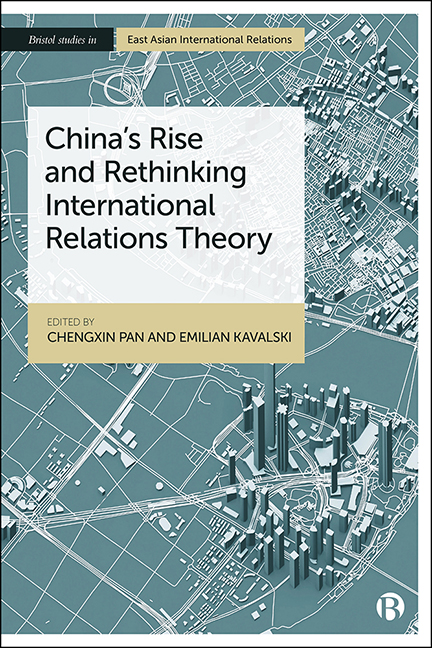Book contents
- Frontmatter
- Contents
- List of Abbreviations
- Notes on Contributors
- Acknowledgements
- Introduction: The Rise of China and Its Challenges to International Relations Theory
- PART I Theorizing China’s Rise: Beyond Eurocentric Knowledge Production
- PART II Theorizing China’s Rise: Critical Reflection on Mainstream Frameworks
- Epilogue: Towards International Relations beyond Binaries
- Index
9 - Sino-capitalism’s Dialectical Processes and International Relations Theory
Published online by Cambridge University Press: 15 September 2022
- Frontmatter
- Contents
- List of Abbreviations
- Notes on Contributors
- Acknowledgements
- Introduction: The Rise of China and Its Challenges to International Relations Theory
- PART I Theorizing China’s Rise: Beyond Eurocentric Knowledge Production
- PART II Theorizing China’s Rise: Critical Reflection on Mainstream Frameworks
- Epilogue: Towards International Relations beyond Binaries
- Index
Summary
China's international ascent over the past 40 years knows few historical parallels. Nonetheless, as several chapters in this volume have pointed out, Western attempts to understand this phenomenon have mainly relied on theoretical constructs established in the West and based on Western historical experiences. This is especially the case with the theoretical approaches that have informed the crucial debates in Western capitals regarding what China's rise implies for the future of the international order.
Some Western perspectives, such as Constructivist and Marxist ones, have been less prevalent in informing these debates. Rather, discussions have been framed by the two dominant approaches in contemporary international relations (IR) theory: the realist school, including approaches to power transition theory; and the liberal school, especially its liberal institutionalist perspective. The reliance on these two dominant strands of Western IR theory has tended to create opposing points of view insufficiently open to alternative interpretations. China's international ascent, however, represents an epochal event that has the potential not only to prove or disprove existing theories, but also to serve as a crucial case (Eckstein, 1975) that generates and informs advances in IR theory.
The purpose of this chapter is then to contribute to ‘theory building’, especially to give contemporary IR theory a much deeper appreciation of the capitalist dynamics shaping international affairs. As the contributions to this volume elucidate, the failure of China's rise to create a shock to IR scholarship is lamentable. For the first time in modern history a non-Western power is in the process of becoming the globe's largest economy. This should be a paradigm-shattering phenomenon (Kavalski, 2018; Pan and Kavalski, 2018), but so far even the most thoughtful works (cf. Kang, 2007; Lampton, 2008; Christensen, 2015) have primarily concentrated on applying existing theories derived from the modern European experience (Acharya and Buzan, 2017).
Put differently, dominant IR analyses continue to see China's rise through Western lenses, often fitting this case in a pre-scripted narrative (Kavalski, 2018), such as the Thucydides Trap scenario. But this historical event should not just be an object of analysis for already established theories. It should also be fruitful terrain for challenging, expanding and reimagining IR theory (Pan and Kavalski, 2018). The case of China's rise can force us to critically reimagine foundational assumptions and ‘pluralize’ our analysis to move beyond dichotomized debates.
- Type
- Chapter
- Information
- China’s Rise and Rethinking International Relations Theory , pp. 190 - 209Publisher: Bristol University PressPrint publication year: 2022



